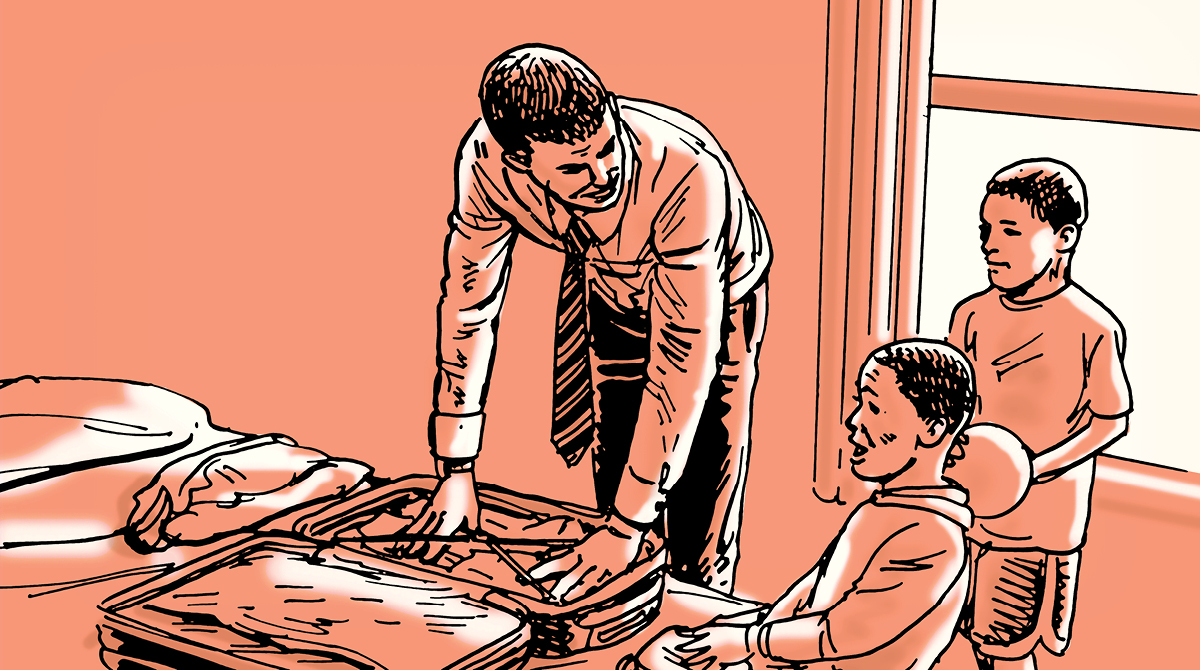
Editor’s note: This is a guest post from Benjamin Jenks.
I know, I know…You are probably thinking two questions.
1. Isn’t hitchhiking really dangerous?
I know a man who hitchhiked around the world, another who hitchhiked through Afghanistan, and I hitchhiked over 14,000 miles around the USA. It can be done and it can be done safely.
Ronald Reagan did it. Dan Rather did it. Author James A. Michener did it—around age 14 with 35 cents in his pocket, to boot. All three of these men survived their hitchhiking adventures and you can too, if you go about it the right way.
Just don’t tell your mom about your trip, until afterwards…no need to worry her.
2. Why would I want to hitchhike?
Hitchhiking is a lot of fun, an inexpensive adventure, and a great way to meet the locals of a region. However, it can also teach you two important masculine values that are sorely needed in today’s world.
A. How to solve problems on your own.
“To find yourself, think for yourself.” – Socrates
Picture being dropped off in a city that you have never been in before. You must quickly figure out where you are, where you can find food and lodging, where are the safe places to be, and where the best spot to continue hitchhiking is.
It is a practical exercise in problem-solving that can help you in multiple areas of your life.
B. How to connect with many different types of people.
“The ability to deal with people is as purchasable as a commodity as sugar or coffee and I will pay more for that ability than for any other thing under the sun.” – John D. Rockefeller
You might be surprised to hear that a wide range of people pick up hitchhikers.
You could get a ride from: a wealthy CEO wanting to reminisce about his or her younger and more adventurous days, a mom who can’t bear to watch a young man standing out in the cold, or a farmer who drives a pickup truck and will pick someone up simply because they are going that direction anyways.
A hitchhiker is put in situations where they are forced to practice their social skills over and over again. The better a hitchhiker is at connecting with others, the easier his trip will be. It is similar in the business world or when dating.
***
The rulebook for how to become a successful man has changed. You can no longer work for a company for 30 years and expect to move up the ranks to a secure position. Even a college degree won’t guarantee you fulfilling work that can support those you love.
However, a man that can solve problems on his own and a man that can connect with other people is a man that can weather the challenges of our day.
Hitchhiking as a Manly Rite of Passage
Centuries ago, some Native American tribes would send their young men into the forests without food, where they would have to fend for themselves and figure things out on their own. These rituals were a rite of passage to manhood and taught these boys how to weather hardship and think for themselves, and instilled confidence in their abilities.
In our own history, many boys were taught the lessons of manhood by working alongside their father in the fields. Every challenge was a lesson to be learned from.
Today, as our culture becomes more and more technological, the men of tomorrow are learning manly values from the latest television show, viral video, or the video game with the best graphics.
Hitchhiking is an adventure that can teach men, young or old, skills to help them be happier. Your mom was right though, that it can be dangerous, especially if you don’t know what you’re doing. Here are some practical tips to help you hitchhike safely.
How to Hitchhike Around the USA
1. Research the Laws
Despite what most people think, hitchhiking is legal in all 50 US states. However, each state, city, and town has subtle differences in their laws that govern the roadways. In most places, if you stay off the highway and are in a place where cars can safely pull over, then you are legally hitchhiking.
The website Digihitch.com (yes, there is an online community of hitchhikers) has the most detailed information on the laws in each state. Read about the region you intend to travel in before you go.
2. Pack Light
The lighter your pack, the happier you will be. Just be sure to have enough gear and supplies, in case you get stranded.
Carry a backpack and pack it like you are heading out on a 3-day hike.
Pack an extra change of clothes, a light jacket, a raincoat, more socks than you think you will use, long underwear, a stocking hat, and great boots.
Put at least 2 jugs of water, some snacks, and suntan lotion in your pack. Also, take a small sleeping bag and a tent. If you can make a warm shelter almost anywhere, this will take a load off of your mind.
Don’t bring anything you would be devastated to lose.
3. Get Your Mind Ready
Be prepared to be looked down upon by most of society and to wait by the side of the road for hours. Look at it as a challenge.
Can you maintain a strong belief in yourself, despite what others think?
If you go in trying to hitchhike just to get somewhere cheap, you will probably end up frustrated. A successful hitchhiker is happy wherever he ends up and is content to amuse himself for long stretches of time.
4. Dress the Part
People pick up hitchhikers that dress like they do. Dress like the people in the area for much better “luck.”
Wear jeans and a flannel shirt in a working-class community. Khakis will work better in a more white-collar community.
Of course it goes without saying that you need to be clean.
5. Choose Your Spot
Choose an on-ramp that has steady traffic on the outskirts of town. The more space for a car to safely pull over, the better.
A nearby stop sign or stoplight will give drivers a chance to look you over. You want to give them as much time as possible to make their decision.
6. Stick Out Your Thumb
Stick out a confident thumb. Look drivers in the eye and smile. Be proud and stand tall. Don’t be sheepish or insecure.
Make sure the drivers can see your eyes and smile. Keep your backpack on, as long as you can without killing yourself.
Find something to do to keep you happy, whether that is singing, playing an instrument, thinking, or listening to music. Don’t sit or read a book though.
Definitely don’t smoke, drink, or do any illegal activities.
If someone flips you off or gives you a dirty look, accept it. Smile or look away and keep doing what you are doing. Don’t let it get to you.
If you start to get in a negative mood, then go rest for 20 minutes. A nap in a warm field or a hot cup of coffee can really rejuvenate your energy.
7. Choose Your Ride
Yes… make sure that you choose your ride.
Learn as much about the driver as you can. Ask them where they are heading and why, before you hop into their car.
As you are listening to their answers, ask yourself a handful of questions.
Are they answering your questions honestly and openly? If they are telling the truth, their answers will make sense and they won’t hesitate when answering.
Are they looking you in the eye? This is an indicator of trustworthiness.
Are they asking you questions and trying to determine if you are a safe person? A trustworthy driver will be a little suspicious of you and concerned for their own safety.
Do I feel comfortable and relaxed around this person? Trust your gut feeling on this.
Does this person generally seem like a happy, relaxed person?
Don’t accept every ride that pulls over. Don’t accept a ride out of desperation—make sure you always have a backup plan. Only accept rides from people you will be safe with. Keep in mind that there will always be another car.
Warning signs to look for in a car:
A. A filthy, strange-smelling car: This can mean the person is irresponsible and doesn’t care for their personal needs.
B. Strange eye contact: Too much or too little eye contact is a sign they have something to hide.
C. Bottles or cans in the car: Look for empty alcohol containers or signs that the driver is intoxicated.
D. More than one person in the car: You have an increased chance of being taken advantage of.
E. Angry, impatient, or controlling mood: These people are less stable and less fun to ride with as well.
If you don’t want to ride with them, some good excuses are:
A. “You know, I was really hoping for a ride going a long ways (no matter how far they are going).”
B. “Actually, I just realized that I forgot to get something back in town. Thanks anyways.”
C. “Ugh…(and look nauseated), something I ate back there is not sitting right. I better go back to town. Thanks though.”
7. In the Car
I always set the tone by asking them questions about where they are going and taking a genuine interest in them. I figure out at least one of their interests and focus our conversation on that. Most drivers want to talk and will be eager to share. Listen intently and ask thoughtful questions.
Some drivers will be curious about you. Share where you are going and why you chose to hitchhike. Most will be fascinated by your courage and admire your freedom.
Share your personal details when you feel comfortable. With some rides, you will be instantly at ease and with others you will always want to stay guarded. Let your instincts be your guide.
Take any gifts that are offered to you, even if you don’t need them. Most people don’t meet someone on an adventure and will enjoy being able to help.
8. Getting Dropped Off
Start to talk with your driver about where they will drop you off early in your ride. I also recommend having a smartphone to check the map.
Insist on getting dropped off somewhere safe like a gas station parking lot.
If you want to continue hitchhiking, shoot for an exit with a truck stop. The more travelers exiting the highway for gas or snacks and then continuing down the road, the better.
Cities can be a challenge too. Ask to get dropped off before or right after a city, because hitchhiking in cities is almost impossible.
Extra Hitchhiking Safety Tips
A. Tell your friends and family where you are heading before you go and set up a time when you will give them a call.
B. Before you get in a car, text the license plate of your driver to a friend or at least pretend to.
C. Be confident, sit up straight in your seat, look your driver in the eye, and be relaxed.
D. Be non-confrontational about philosophical, political, or spiritual issues.
E. Stand up for yourself if you have to, and say no, if you feel the need.
F. If you feel unsafe, look like you are going to puke all over their car and ask to be let off as soon as possible.
Have you hitchhiked before? Have any more tips? Share your experiences and tips in the comments!
_______________________
Benjamin Jenks continues to hitchhike around the USA and is traveling around the world over the next 5 years. He makes inspirational videos about his adventures and gives out practical travel tips at AdventureSauce.com.







